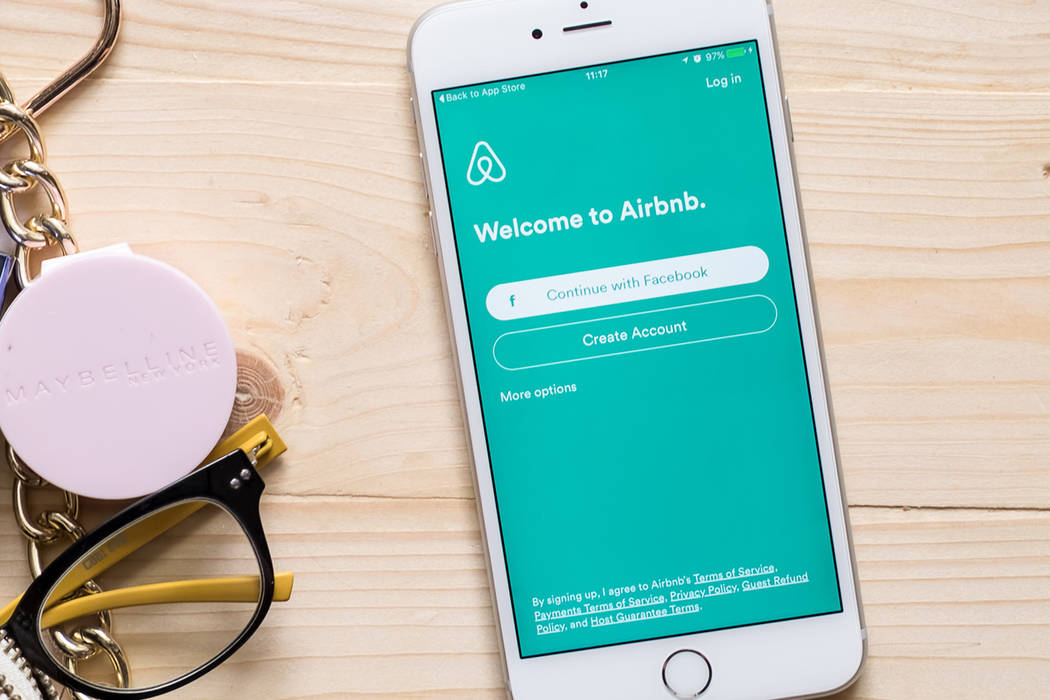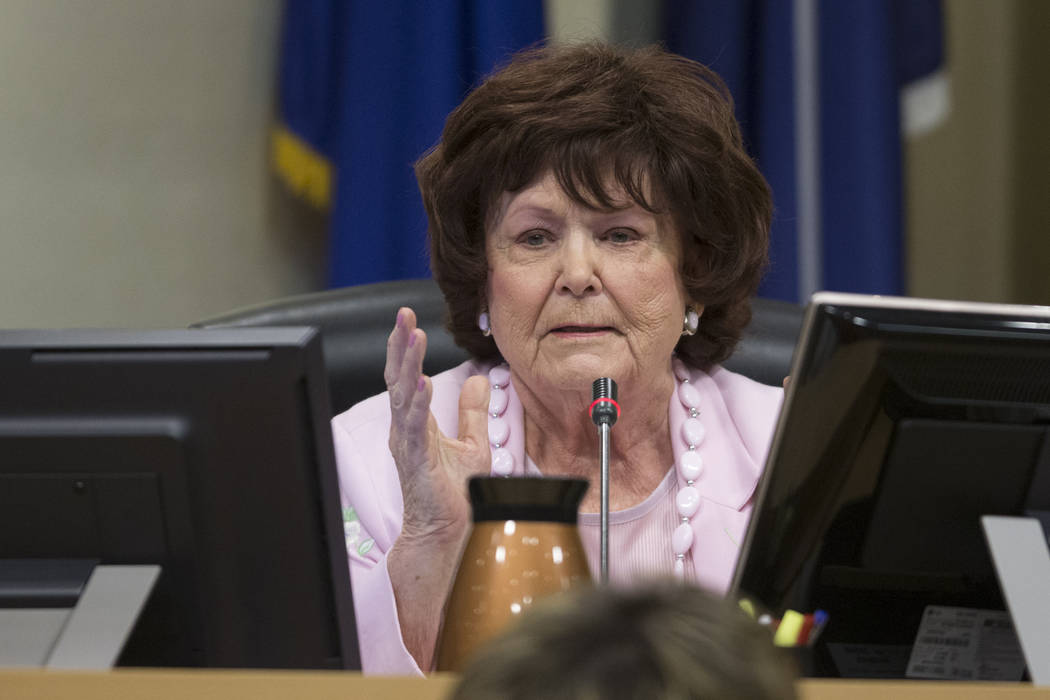Some owners defy crackdown on illegal Las Vegas short-term rentals


As Las Vegas officials enact stricter policies and set up ways to better report and track illegal home-sharing, there is a growing sense from City Hall that those efforts aren’t being taken seriously.
Two fines totaling $200,000 levied earlier this month — the largest penalties against operators since at least 2015 — are emblematic of the city’s escalating war on unlicensed short-term rentals and reflect frustration with homeowners who have repeatedly skirted ever-tightening rules.
Offenders often ignore cease-and-desist orders, continuing unlawful operations for up to 200 days, and have paid only a fraction of the $465,000 in penalties levied over the past four years, according to city data analyzed by the Review-Journal.
“This has been going on for a long time: repeated ignorance on purpose, apparently, of our notices, of our inspectors,” Councilman Bob Coffin said earlier this month, lamenting one case of long-term defiance.
The number of cases opened has steadily risen each year since 2015, and nearly all fines during that time have stemmed from cases launched in the past two years.
But in a city where there are more than 1,100 illegal short-term rentals — more than five times the number of lawful ones, 192 — division exists among city leaders over whether the current combative strategy is the most effective.
Two measures approved
The last two major policy decisions to rein in short-term rentals were passed by 4-3 margins. In June 2017, the City Council enacted a special-use permitting process for would-be rentals. Then it limited new permits this month to owner-occupied homes — leaving just a small number of applicants — which is likely to significantly restrict the growth of the market.
“Who wants to stay in an Airbnb where the owner’s there?” Councilman Stavros Anthony said this week. “People just don’t do that.”
Anthony voted against both measures, but he shared in the chagrin over noncompliance.
He spoke of one operator who received notice to cease rental activity in the 3600 block of North Campbell Road and later failed three of 12 code inspections: “He could really give a c—- what the city of Las Vegas said to him,” Anthony said.
But Anthony said he believed a restrictive policy will leave the city without the revenue and resources to adequately keep illegal home-sharing in check. And such a policy will stifle the ability of good-faith operators to “come out of the shadows” and be vetted before the council, he added.
Airbnb and similar companies have castigated the city for its rules and said they might harm tourism and the economy.
Mayor Pro Tem Lois Tarkanian, who had acknowledged that battling illegal short-term rentals might be her legacy, warned against drawing early conclusions about the enforcement campaign and said that policies that have undoubtedly captured the attention of the industry can be sharpened.
“We started from nowhere. The numbers are misleading to an extent because we are just starting to do this,” she said. “You can’t say (policy) is solid forever. What I’m saying is, this is solid for now.”
Penalties hit, but money waits
Through last week, the city had secured $68,688, or less than 15 percent of fines connected to illegal short-term rentals since 2015, according to city data.
If a property accrues a large amount of penalties from failed inspections, the council may authorize recording a lien against the property. Otherwise, the debt is sent to collections, according to code enforcement supervisor Vicki Ozuna.
“We do have a large amount outstanding, but we’re going to make additional efforts to get those fees paid,” she said.
During its first meeting in December, the council approved levying fines and recording liens against two unlicensed short-term rental proprietors totaling a bit more than $200,000.
The penalties — $103,284 and $97,428 — surpassed the nearly $73,000 charge to a homeowner in March. A unit at The Ogden received the higher of the two fines.
The downtown high-rise has become a flashpoint in the fight against illegal short-term home sharing, defined as stays of fewer than 31 days. The owner never responded to a cease-and-desist order, city officials say. City code enforcement performed 27 site inspections over the course of a year and reported observing short-term rental guests during eight of those visits.
After serving a search warrant for data to Airbnb, the most visible player in the short-term rental industry, the city reported it discovered 200 days of unlicensed rental activity at theunit between Dec. 30 and Sept. 9. The penalty factored in $500-per-day civil penalties, completed code enforcement inspections and assessed late fees.
Doubling down enforcement
Illegal short-term rentals have dropped by 400 since February, when there were roughly 1,500. Where there were once 42 open cases at The Ogden, there are now roughly 25, according to Ozuna.
She said that stricter policies, a hotline to report illegal rentals and a third-party partnership to more easily identify potential bad apples have gone a long way in reducing the number of home-sharing properties.
In the 18 months prior to the city enacting the special-use permitting process, code enforcement had opened 107 cases investigating alleged illegal short-term rentals. In the year and a half since, 265 cases have been opened.
Sixty-one of 185 applicants who sought the necessary permit have been approved. About one-fifth of permit seekers were attempting to rectify open cases against them, Ozuna said.
That includes the owner of a unit in The Ogden rented by Las Vegas mass shooter Stephen Paddock prior to the Life is Beautiful Festival last fall. The city began monitoring the condo on Nov. 19, 2017, less than two months after Paddock checked out, and later determined the out-of-state property owner rented out the unit through Airbnb for 20 days between Dec. 8, 2017, and June 2 of this year.
The council on Dec. 5 approved a $10,000 fine against the owner, although the owner’s attorney disputed the length of stays and said his client had cooperated with the city. The attorney said the owner had been granted a grace period to clear the calendar while also trying to accommodate those who had booked the unit well in advance.
The number of cases — and fines — is only expected to increase after the owner-occupied measure, which could weed out some 85 percent of home-sharing hopefuls by virtue of how prevalent absentee homeowners are in the city’s existing legal short-term rental market.
“We want people to understand that if you want to take your chance and not stop that activity,” Ozuna said, “that you’re also taking a chance that you’re going to end up at a council meeting and getting a $100,000 fine.”
A case itself does not necessarily infer findings of illegality, and not all lead to penalties. In fact, the city had not issued fines in 84 percent of 405 cases since 2015.
Toll on resources
“If the issue wasn’t occurring, they could be dealing with (other) public nuisance issues,” Ozuna said about code officers’ effort to keep up with illegal short-term rental use.
The department receives about 10 complaints a month through neighbors, but the majority through the hotline it set up to collect tips and the third-party company that provides details about short-term rental usage in the city.
Since June, the department has put two full-time inspectors on the beat and is currently spending about $500,000 a year in staff and administration time.
Contact Shea Johnson at sjohnson@reviewjournal.com or 702-383-0272. Follow @Shea_LVRJ on Twitter.
Illegal short-term rentals in Las Vegas
65 — fined since 2015.
34 — paid fine either in full or partly since 2015.
$465,634 — penalties assessed since 2015.
$68,688 — penalties paid since 2015.
1,100-plus — operating in city.
192 — legal short-term rentals operating in city.
Source: City of Las Vegas













